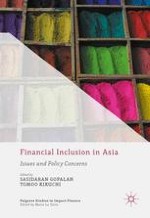2016 | OriginalPaper | Buchkapitel
5. Financial Inclusion in Indonesia: Moving Towards a Digital Payment System
verfasst von : Moekti Prasetiani Soejachmoen
Erschienen in: Financial Inclusion in Asia
Verlag: Palgrave Macmillan UK
Aktivieren Sie unsere intelligente Suche, um passende Fachinhalte oder Patente zu finden.
Wählen Sie Textabschnitte aus um mit Künstlicher Intelligenz passenden Patente zu finden. powered by
Markieren Sie Textabschnitte, um KI-gestützt weitere passende Inhalte zu finden. powered by
